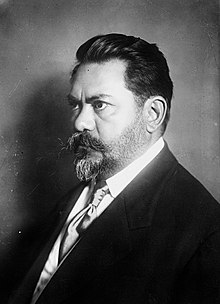Manuel Franco
| Manuel Franco | |
|---|---|
 |
|
| President of Paraguay | |
|
In office August 15, 1916 – June 5, 1919 |
|
| Preceded by | Eduardo Schaerer |
| Succeeded by | José Pedro Montero |
| Personal details | |
| Born |
July 9, 1871 Concepción, Paraguay |
| Died | June 5, 1919 (aged 47) Asunción, Paraguay |
| Political party | Liberal Party |
| Occupation | Master lawyer |
Manuel Franco (July 9, 1871 – June 5, 1919) was President of Paraguay from August 15, 1916 to June 5, 1919.
Doctor Manuel Franco was born in Concepción on June 9, 1871 in times of the government of Cirilo Antonio Rivarola. Manuel was son of Josefa Antonio Franco and was baptized in the Church of Concepción by Father Evaristo Serrano.
He never married but during his life fathered four children: Evaristo, Fernando, María Ana and Manuel Franco Jr.
After concluding his elementary studies, the young Manuel, accompanied by his aunt Trifona Franco de Isnardi, traveled to Asunción to continue his studies. He got in the National School as a boarder.
He moved to the Capital in 1891. He was fellow student of Adolfo Riquelme and Eugenio A. Garay. He went to Law School where he got a PhD.
His limited resources forced him, during his university studies, to accept bureaucratic positions.
In 1893 he was appointed 1st official of the General Accounting Secretary of the Nation and in 1894 Book-keeper of the same institution.
In spite of his liberal position about politics, he pursued a career in the public administration.
In August 1899, he integrated the National Council of Education, along with Manuel Domínguez. President Escurra appointed him, in June 1903, Director of the Colegio Nacional de la Capital, position he occupied until his replacement in 1907 by Cleto Romero.
In May 1905, he became part of the commission in charge of investigate the regimen of Colorado (a political party) government after it was overthrown. Other members of this commission were Gerónimo Zubizarreta and Francisco Rolón.
During the government of Emiliano González Navero, Manuel was appointed Minister of Justice and in 1908, Minister of the Interior.
Months later he became Director of the Agricultural Bank and in 1910 he obtained the tenure of the Supreme Court of Justice, along with Francisco C. Chávez and Manuel Burgos.
In 1912 he was Senator of the nation. In 1913, he became Director of Public Prosecutions Ad Hoc and in 1916 he returned to his place at the Senate.
His activity in politics was result of his constant interactions with renowned people in the intellectual world. He was part of a radical group of Liberalismo (a political party) and had Manuel Gondra as his mentor.
...
Wikipedia
